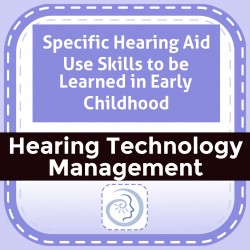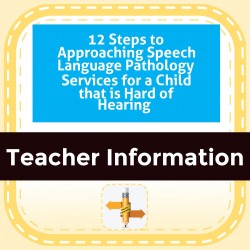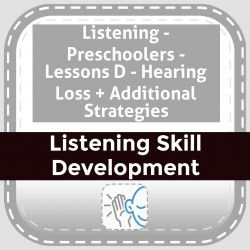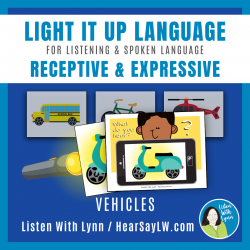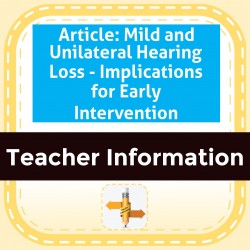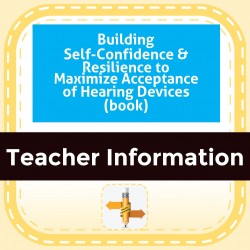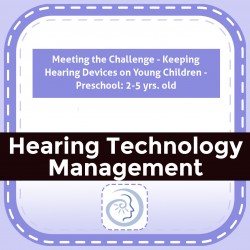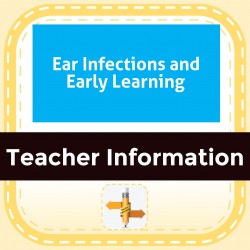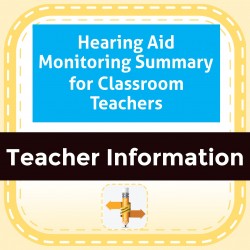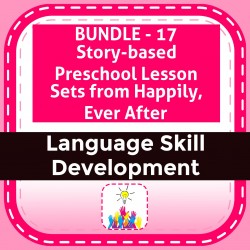Ability Levels
Categories
Resource Types
Age/Grade Range
CCSS
Anchor Standard
Speaking & Listening
Language
Reading
Specific Hearing Aid Use Skills to be Learned in Early Childhood
$ 0
This information specifies 5 hearing-aid-wear skills to master by age 3, or no later than the end of preschool. It includes a chart specifying the role of the parent, the child, and the DHH profession
...
al for each of 7 skills.
12 Steps to Approaching Speech Language Pathology Services for a Child that is Hard of Hearing
$ 0
Guide written for speECH- language pathologists and others new to meeting the needs of students who are hard of hearing. Provides 12 stePS- to consider when determining appropriate services and accomm
...
odations.
Listening - Preschoolers - Lessons D - Hearing Loss + Additional Strategies
$ 595
For teachers who work with early identified children with hearing loss. Includes fictional case studies with goals/objectives and specifically targeted activities to use with students who fit a partic
...
ular set of criteria in terms of hearing loss and device. Includes fillable lesson plans.
VEHICLES Auditory Processing Receptive & Expressive Language
$ 5
You'll love the VEHICLES version of Light It Up Language! Kids listen to clues to identify 16 hidden VEHICLES vocabulary pictures. Each of the pictures has four clues that are increasingly more specif
...
pecific.The magic happens by lighting up the “What Do You Hear?” cards. Hidden pictures are held up to a flashlight and the VEHICLES images amazingly appear. How fun! Once the hidden picture is revealed the child recalls and uses the clues to describe the VEHICLES. Thereby stretching their auditory memory, descriptive language, and expressive language skills.TARGETS: RECEPTIVE: This game builds critical thinking and reasoning skills by categorizing, making inferences, and drawing conclusions. EXPRESSIVE: The child recalls and uses clues to describe the hidden object. INCLUDES:✧ Listening & language guide with instructions✧ Target or goal suggestions✧ 8 What Do You Hear? cards (printed twice)✧ 16 Hidden ANIMALS Picture Vocabulary Cards✧ 64 Prompt Clues - 16 objects with four details each that get increasingly more specific✧ A Script with scaffolding strategies✧ Listening and Spoken Language Tips ➼ EASY one-time quick game prep and you're all set to use year after year. ➼ You’ll need a FLASHLIGHT, a lamp, or a sunny window.◈ ◈ ◈ ◈ ◈ ◈ ◈ ◈ ◈ ◈ ◈ ◈ ◈ ◈ ◈ ◈ ◈ ◈ ◈ ◈ ◈ CUSTOMER TIPS:➼ Questions? Please email me before purchasing this resource or anytime later.♥ Sign-up HERE for the Listen With Lynn emails♥ For more ideas visit my blog: HearSayLW.comSTAY CONNECTED:✧ Sign-up here for the Listen With Lynn emails✧ Follow on Facebook - Lynn A. Wood - LSL Auditory Verbal Therapist and Rehab Audiologist✧ Follow on Instagram @auditoryverbal_listenwithlynn❤ Keep up your excellent work. I am blessed to help along the way. Thanks so much!Lynn Wood
Article: Mild and Unilateral Hearing Loss - Implications for Early Intervention
$ 0
This article presents a brief review of the research and discusses issues related to mild bilateral hearing loss and unilateral hearing loss. Implications for early intervention services are outlined.
...
Building Self-Confidence & Resilience to Maximize Acceptance of Hearing Devices (book)
$ 14
A significant proportion of students with hearing loss refuse to use hearing technology necessary for their educational access, often because they feel as though they do not fit in to their peer group
...
. The purpose of this book is to raise awareness for the reasons why hearing device rejection happens and specific instruction to occur at different ages to build student resilience and self-‐confidence, thereby increasing the likelihood that they will not reject using their hearing technology. Specific teaching activities and recommendations for instructional materials to develop identified skills have been included in this Guide.
Meeting the Challenge - Keeping Hearing Devices on Young Children - Preschool: 2-5 yrs. old
$ 0
Brochure specifying what makes it challenging to keep hearing aids on 2-5 yrs old, why hearing aids are needed, and strategies to help keep them on, including hearing aid retention devices.
Ear Infections and Early Learning
$ 0
Informational handout about the impact of fluctuating hearing loss caused by recurrent ear infections. Includes prevalence of ear infections in children, relationship to learning issues and what famil
...
ies and interventionists can do.
Hearing Aid Monitoring Summary for Classroom Teachers
$ 195
This handout is a summary of hearing aid monitoring for classroom teachers. It answers the why, when, and how of hearing aid listening checks. Pair with a handout describing performing the Ling Sound
...
check P01TEA0472
BUNDLE - 17 Story-based Preschool Lesson Sets from Happily, Ever After
$ 1995
17 Story-based Preschool Lesson Sets - Early Childhood / Preschool teaching materials for the book includes a) a synopsis of the storybook b) a letter to send home to families explaining the storybook
...
unit and activities they can do at home c) suggestions for setting up your classroom to revolve around the story (dramatic play area, sensory area, art area, science area, book area, and bulletin board) d) activities separated into two weeks, each week including: a distinctive thematic, e) focus of the Week; Circle Time activities including songs, poems, fingerplays, and story-reading ideas; and six detailed Group Activities with designated target areas, f) snacks related to the story, g) a Pretest and Posttest. BUNDLE IDs P06LAN0437-0453.
 Your browser is out of date. For best experience switch to latest updated Browser.
Your browser is out of date. For best experience switch to latest updated Browser.
 Get Chrome
Get Chrome Get Edge
Get Edge Get Firefox
Get Firefox